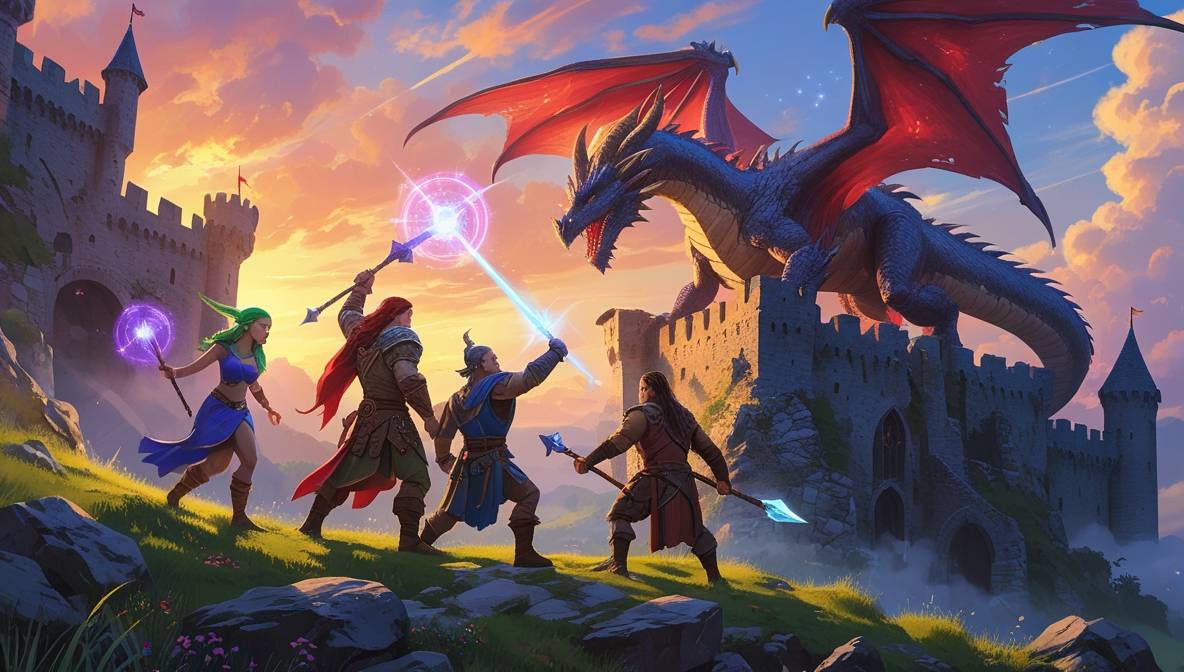Role-playing games (RPGs) have defined generations of gamers with their immersive storytelling, intricate worlds, and unforgettable characters. At VipGame24, we’ve curated the ultimate list of the best RPG games of all time, blending timeless classics, modern epics, and hidden gems. Whether you’re a fan of turn-based combat or open-world exploration, this guide dives deep into the genre’s evolution, impact, and future.
What Makes an RPG Legendary?
To rank the best RPG games, we evaluated these core criteria:
| Factor | Description |
|---|---|
| Storytelling | Depth of plot, character arcs, and narrative choices. |
| World-Building | Immersive environments, lore, and interactive elements. |
| Gameplay Mechanics | Combat systems, progression, and replayability. |
| Cultural Impact | Influence on the gaming industry and pop culture. |
For example, The Witcher 3 excels in branching narratives, while Skyrim redefined open-world exploration.
Timeless Classics That Built the RPG Genre
1. Dungeons & Dragons (Tabletop)
The grandfather of RPGs, D&D introduced character classes, moral alignment, and collaborative storytelling. Its influence is evident in franchises like Baldur’s Gate 3 and Divinity: Original Sin 2.
2. Final Fantasy VII (1997)
This PlayStation classic revolutionized JRPGs with its cinematic storytelling and materia system. The 2020 remake modernized its legacy, blending real-time combat with nostalgic charm.
3. Planescape: Torment (1999)
A narrative masterpiece, Planescape prioritized philosophical depth over combat. Its question—“What can change the nature of a man?”—still resonates today.
Explore more classics: Top 10 Classic Games That Still Hold Up Today
Modern RPG Masterpieces
1. The Witcher 3: Wild Hunt
CD Projekt Red’s opus features morally gray choices, a sprawling open world, and Geralt’s gripping saga. Its expansions, Hearts of Stone and Blood and Wine, set new standards for DLC.
2. Elden Ring
FromSoftware’s 2022 hit merged Dark Souls’ challenge with George R.R. Martin’s lore. Players praise its non-linear exploration and cryptic storytelling.
3. Baldur’s Gate 3
Larian Studios revived the CRPG genre with this D&D-inspired epic. Its turn-based combat and 17,000 ending variations make it a modern benchmark.
Looking ahead? Check out Most Anticipated Game Releases of 2024.
Underrated RPG Gems You Can’t Miss
- Disco Elysium (2019): A detective RPG with zero combat, focusing on dialogue and skill checks. Its political themes and surreal world earned it a cult following.
- CrossCode (2015): A retro-inspired action RPG with pixel-perfect combat and puzzles.
- Tyranny (2016): Play as a villain in a world where evil has already won.
For indie enthusiasts: Top 10 Indie Games You Should Try.
How RPG Mechanics Have Evolved
- Character Progression: Early games like Ultima used basic leveling. Modern titles like Cyberpunk 2077 offer skill trees and lifepath customization.
- Combat: Turn-based systems (Dragon Quest) evolved into real-time hybrids (Final Fantasy VII Remake).
- Player Agency: Games like Mass Effect and Detroit: Become Human let choices ripple across entire stories.
Dive deeper: The Evolution of Gaming: From Arcade to VR.
RPGs in Pop Culture: Beyond the Screen
- Movies/TV: The Last of Us and Arcane prove games can rival Hollywood storytelling.
- Literature: Novels like The Stormlight Archive borrow RPG-esque world-building.
- Tabletop Resurgence: D&D campaigns dominate Twitch, with shows like Critical Role attracting millions.
For fans: The Best Story-Driven Games You Must Play.
The Future of RPGs: AI, VR, and Beyond
- AI-Driven Worlds: Generative AI could create dynamic NPCs and infinite quests.
- Virtual Reality: Titles like Half-Life: Alyx hint at fully immersive RPG experiences.
- Cross-Platform Play: Games like Genshin Impact unify mobile, console, and PC players.
Tech-savvy? Explore How VR Gaming is Shaping 2025.
Try now:
At VipGame24, we’re committed to delivering expert insights into gaming’s past, present, and future. For more rankings, guides, and industry news, explore our Gaming Blog.

